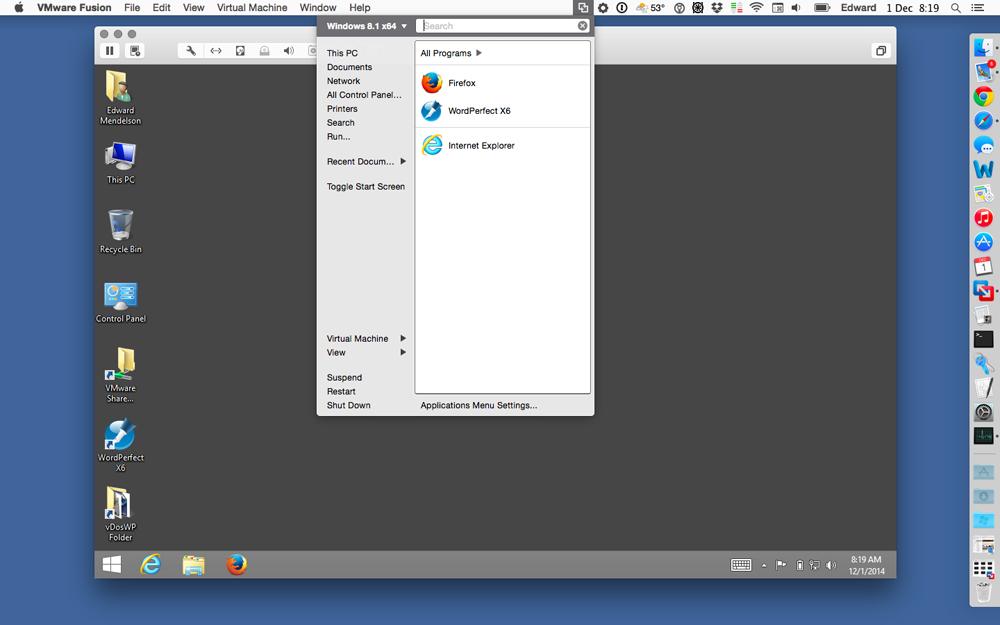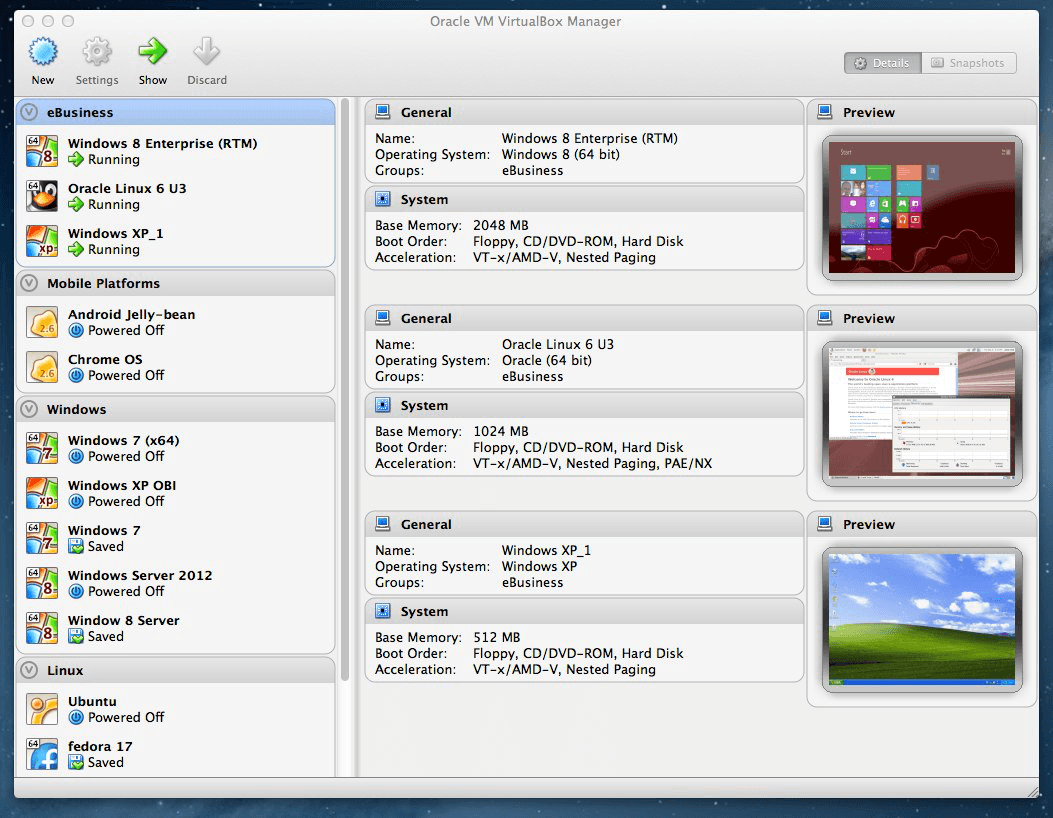Boot Camp works great natively, while VMware Fusion and Parallels can virtualize the games, and Wine simply translates Windows API calls to run games smoothly. For any Mac users looking to play PC games on Steam, these programs are great. In part 1 of my Running Windows on a Mac series, I made it very clear that virtualization solutions such as Parallels or VMware Fusion are merely a compromise for anyone who needs to get serious.
VMWare and Virtual Box are the two best and most used virtualization software available for your desktop. When you go to Google searching for a good virtualization tool for your PC, you’ll meet with two of them. But, this might leave you puzzled if you don’t know which one is better for you. So, to help you decide which one to choose, I’m writing this post.
Here, I will provide you a detailed explanation of VMWare vs Virtual Box. Just go through this comparison and you’ll be able to choose the right software for your system.
Contents
- 1 What is Virtualization Software?
- 2 VMWare vs VirtualBox: 5-Point Comparison to Help You Decide
What is Virtualization Software?
Virtualization Software is a tool that allows you to run two or more operating systems within a single computer. That means you can run software and apps meant for an operating system on your different OS-run computers by virtualization. The one computer in this procedure is physical and the other is virtual. That is why the process is termed as virtualization. These tools are also known as “Hypervisor” as they allow your PC to host multiple operating systems.
These tools are generally used for testing apps or software by the developers on different platforms. This saves them from buying the specified hardware and save money. Another use of these tools is to run ancient apps on your system that aren’t originally meant for it. And, you can also create a snapshot of your PC with it. VMWare and VirtualBox are the two most popular names in this category. Let’s take a quick look at what they are, next.
Introduction to VMWare
VMWare Workstation Pro is an incredible Virtualization tool available for desktop that allows you to run multiple operating systems on your computer. Here are some of the highlights of VMWare Workstation Pro that’ll help you understand it better.
- It allows you to run multiple operating systems on a single PC.
- You can securely connect with vSphere, ESXi or other Workstation servers to launch, control and manage both virtual machines (VMs) and physical hosts.
- This tool supports hundreds of operating systems and works with cloud and container technologies like Docker and Kubernetes.
It is one of the best options you’ll get while finding the right virtualization tools.
Introduction to Virtual Box
Virtual Box is another virtualization tool for your PC that allows you to run multiple operating systems on it. Here are some of the highlights of Virtual Box that’ll help you understand it better.
- It is a powerful x86 and AMD64/Intel64 virtualization product for enterprise as well as home use.
- It is an open-source tool, hence, it is available for free.
- Supports all the major platforms like Windows, Mac, Linux, etc.
- This tool is actively being developed with frequent releases.
If you are looking for a feature-rich virtualization tool, Virtual Box can become your instant favorite.
VMWare vs VirtualBox: 5-Point Comparison to Help You Decide
Here is a 5-Point comparison that’ll help you decide which virtualization tool you should choose. We will compare the performance, price, availability, user-interface, and other highlights as a part to conclude which tool has an edge over the other. Let’s start our comparison of VMWare vs VirtualBox.
1. VMware vs VirtualBox: Performance
VMWare and VirtualBox both serve the basic functions and have all the features that the majority of the users need. VMWare WorkStation Pro has an excellent speed that boosts the overall performance.
On the other hand, VirtualBox is comparatively slower and especially, since Oracle acquired it in 2010. It is currently one of the slowest virtual machines available on the web.
When we tried to run the same guest operating system in both virtual machines while keeping the same amount of resources allocated, we concluded that VMWare is way better than Virtual Box performances-wise.
2. VMWare vs VirtualBox: Price
VirtualBox is an open-source virtualization tool. Therefore, it comes for free. The core engine that drives it is completely open-source but the ‘extension pack’ is licensed by Oracle and is only free for personal use, educational use, or evaluation purposes. On the other hand, if you choose VMWare Workstation Pro, you have to spend a good amount of money. But, you can choose the free version known as VMWare Workstation that is meant for students, non-profit organizations, and personal use.
So, depending upon how you want to use the tool, you can pick it. I’d recommend going for VirtualBox if you don’t want to spend any money and want all the needed features. But, VMWare Workstation isn’t bad either.
3. VMWare vs VirtualBox: Availability
VirtualBox is available on all the major platforms like Windows, Mac, Linux, and many more. On the other hand, VMWare is only available for Windows and Linux, and not for Mac. So, if you are a Mac user, you’ll have to go for Virtual Box.
Virtual Box can even clone an existing operating system on another computer. This means that you can clone the Linux development environment on your Windows computer. This availability of more operating systems gives Virtual Box an edge over VMWare.
4. VMWare vs VirtualBox: User Interface
Using a Virtualization tool isn’t something complex but it can be confusing for the new users. But, as you get on a roll, things unveil themselves and everything gets very easy. When you use Virtual Box for the first time, it provides a walkthrough wizard that guides you about using it. It also recommends how much RAM and hard disk space you shall keep aside based on your PC. It has a very simple and self-explanatory user-interface.

On the other hand, VMWare Workstation Player’s starting wizard is even more detailed and brief. It also provides all the recommendations that you’ll need and guides you throughout the setup.



The only limitation is that it doesn’t tell you the exact values for RAM and HDD like Virtual Box. Apart from that, the user interface is very simple and easy to understand
5. VMWare vs VirtualBox: Other Highlights
Virtual Box has some unique features like Snapshots and Extension Pack. The Snapshot feature lets you take a ‘Snapshot’ your system and save its entire state of that moment. And, the Extension Pack provides some advanced features like support for USB 2.0, 3.0 devices, and others. On the other hand, VMWare has ‘Encrypted Virtual Machines’ that are much needed to build a secure environment.
There are certain features that are mutual to both these tools like shared folders, shared data transfer, and seamless mode or unity mode.
Final Verdict
Vmware For Mac Os
I hope you have made your decision by now. This was the complete comparison between the two top virtualization tools for PC. VMWare vs Virtualbox is an old rivalry and this post helps you to get the highlights from it. If you are tight on budget, you can go for Virtual Box, but if sheer performance is your need, VMWare is the best one to pick. If you have some good or bad experiences with any of the tools mentioned here, make sure you share them with us in the comments section.

Best Windows Vmware For Mac Os
That’s all for this post. I hope you find it helpful and this clears your confusion for once and for all.
